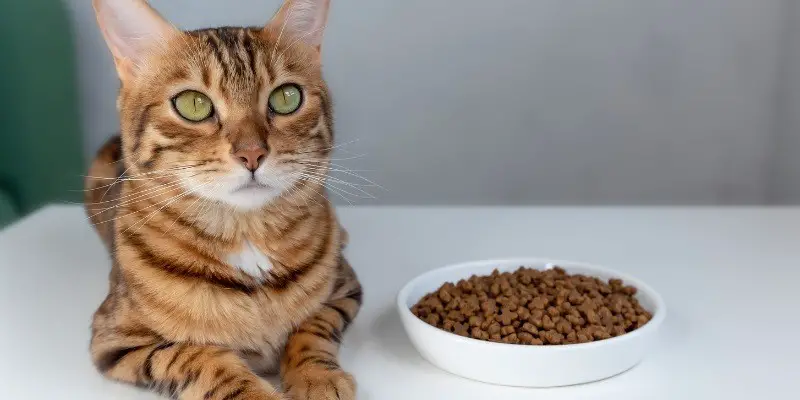Bengal cats, known for their stunning leopard-like appearance and dynamic energy, require a specialized diet to match their distinctive physical and behavioral traits. Understanding their unique nutritional needs is essential to maintaining their health and vitality.
Understanding the Bengal Cat Breed
- Breed Characteristics: Bengals are muscular, agile, and highly active. They are known for their playful and curious nature, which often translates into a high energy expenditure.
- Unique Dietary Needs: Given their active lifestyle, Bengals require a diet rich in high-quality proteins to support muscle development and sustain their energy levels.
Nutritional Requirements for Bengals
- High-Quality Protein Sources: Animal-based proteins like chicken, turkey, fish, or rabbit are ideal for Bengals, providing the essential amino acids they need for muscle maintenance and overall health.
- Balanced Fats and Carbohydrates: While protein is the cornerstone of their diet, balanced levels of fats and carbohydrates are also vital. Fats provide a concentrated energy source, and carbohydrates offer additional energy, though they should be present in moderate amounts.
- Vitamins and Minerals: Essential nutrients like taurine are crucial for heart and vision health. A balance of vitamins and minerals supports immune function and overall well-being.
Top Cat Food Brands for Bengals
- Blue Buffalo Wilderness High Protein Dry Cat Food: Tailored for active breeds like Bengals, offering high protein content from real chicken.
- Pros: Grain-free, contains life-source bits for antioxidants.
- Cons: Some cats might be sensitive to rich formulations.
- Price: Around $36 for a 12-lb bag.
- Availability: Widely available in pet stores and online.
- Royal Canin Feline Health Nutrition Fit and Active: Formulated for active, adult cats with balanced protein and fat content.
- Pros: Supports lean muscle mass, and aids digestive health.
- Cons: Includes grains, which some owners may prefer to avoid.
- Price: Approximately $30 for a 7-lb bag.
- Availability: Pet stores and online retailers.
- Wellness CORE Natural Grain Free Dry Cat Food: High-protein, grain-free food, suitable for Bengals.
- Pros: Made with turkey and chicken, no meat by-products.
- Cons: Higher price point.
- Price: About $42 for a 12-lb bag.
- Availability: Pet stores and online.
- Orijen Dry Cat Food, Biologically Appropriate & Grain-Free: Known for its high meat content and biologically appropriate ingredients.
- Pros: Variety of fresh, whole meats, high protein content.
- Cons: Premium price.
- Price: Around $65 for a 12-lb bag.
- Availability: Specialty pet stores and online.
- Purina Pro Plan Focus Adult Weight Management: Good for Bengals who need help maintaining a healthy weight.
- Pros: High protein content, supports lean muscle.
- Cons: Contains some corn and wheat products.
- Price: Approximately $40 for a 16-lb bag.
- Availability: Major pet stores and online.
Feeding Strategies for Bengal Cats
- Portion Control and Feeding Frequency: Bengals are prone to obesity if overfed. It’s important to control portion sizes and stick to a regular feeding schedule.
- Raw and Wet Food Diets: Incorporating raw or wet food can provide additional hydration and variety. However, any dietary changes should be gradual to avoid digestive upset.
Special Dietary Considerations for Bengals
- Addressing Common Health Issues: Bengals may be predisposed to certain health issues such as heart disease or digestive problems. Tailored diets or supplements may be recommended by a veterinarian.
- Life Stage Nutrition: Nutritional needs change as Bengals age. Kitten formulas, adult maintenance diets, and senior-specific foods cater to these varying requirements.
FAQs About Cat Food for Bengals
- Are grain-free diets better for Bengals? While some Bengals may benefit from grain-free diets, it’s more important to focus on overall nutritional balance and high-quality protein sources.
- How much should I feed my Bengal cat? The amount depends on the cat’s age, weight, and activity level. Refer to feeding guidelines on the cat food packaging and consult your vet.
- Can Bengals eat a raw diet? Raw diets can be suitable for Bengals but require careful planning to ensure nutritional completeness. Consulting with a vet or a pet nutritionist is recommended.
- What should I do if my Bengal is a picky eater? Offer variety in flavors and textures. Sometimes, warming the food or adding a small amount of wet food to dry kibble can increase palatability.
- Are supplements necessary for Bengals? Most quality commercial diets are nutritionally complete. However, supplements may be beneficial in specific cases, such as joint supplements for older Bengals.
Conclusion
Feeding your Bengal the right diet is crucial for their overall health and well-being. A diet high in quality protein, balanced with essential nutrients, and aligned with their life stage can support their active lifestyle and robust health. Regular veterinary check-ups and staying informed about your Bengal’s specific needs will ensure they thrive.

Jane Doe, a veterinarian with over 10 years of experience, combines her deep knowledge of animal health with a passion for pet welfare at PetsPonder.com. With a DVM degree and a commitment to the latest in veterinary science, Jane Doe offers reliable, compassionate advice to help pet owners make informed decisions for their furry companions.

Leave a Reply